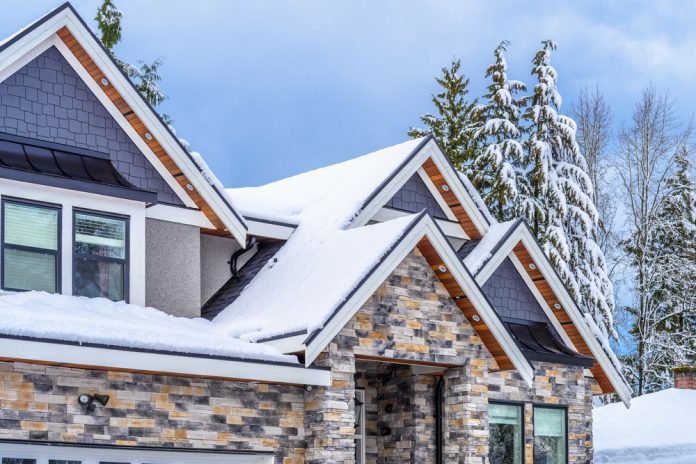Last Updated on January 14, 2022 by
It is that time of year again, and the leaves are starting to change colours. The days are getting shorter, and it is time for homeowners to prepare their roofs for winter!
Amid all the prep work that we put in to prepare ourselves for the harsh winter season, the home roof is often forgotten. Nonetheless, there are certain things you should do to make sure that you have a safe and secure home throughout the winter.
Moreover, as the cold weather sets in, it’s common for many homeowners to put their homes up for sale. If you’re one of them, make sure to get your roof repaired before listing it. You should also avoid doing any major repairs during winter unless necessary because the weather tends to complicate things especially if there is snowfall!
To give you a better insight – this article will provide you with roof maintenance tips, so your roof can survive the harsh weather conditions with ease!
Table of Contents
Roof maintenance essentials: Where do you start?
To begin, start by inspecting the attic space where all the wiring to your lights, water heater, etc. are located. Any holes or gaps could allow rainwater into these places which would then spread throughout your house – causing dampness to settle in. That’s not all, a mold can also start to develop which is hazardous to people suffering from asthma or allergies.
After inspecting the attic, examine your roof for any loose tiles or shingles. If you find any, call a roofing contractor to repair these areas as soon as possible – before the heavy winds come along and rip them off completely.
These repairs can be expensive so avoid putting them off until they must be done. Rain, sleet, and snow can damage the roof of your home if it has not been properly prepared for winter’s worst. This lack of preparation can cause leaks in your roof or even worse, expensive repairs to fix damaged areas.
All in all, the best way to make sure your roof is all set for the winters is to get it inspected by a roofing specialist. There’s a wide range of roof maintenance services available today. Some of them being – inspecting damages or deterioration of materials such as shingles, making small repairs if needed, clearing debris, and inspecting roof drainage.
Moving ahead, here are some tips that will come in handy when you’re setting out to prepare your roof for the winters.
Read ahead :
1. Check your insulation –
You should make it a point to check the condition of your attic insulation and ventilation, so you can keep warm in winter without wasting too much energy. If there is not enough insulation or poor venting, the heat will escape through ceilings and floors – causing rooms to be colder.
Some helpful tips for properly insulating your attics are –
– If you are hanging insulation, make sure it is secured into the framing of your roof.
– Check for loose insulation on top of beams and around plumbing vents or ductwork.
– If you are looking for extra insulation, it is important to assess the age of your home. Older homes tend to have poorer insulation quality than newer ones – because they were built before modern technology that helps insulate houses was available.
Ultimately, the best insulation is the one that fits your needs.
2. Inspect your drainage systems –
Check all gutters and downspouts and make sure water can drain properly from them by clearing debris, leaves, or ice blocking the way. You should also check the roof drainage system and repair any issues you might find before too much snow accumulates on top of your roof.
Further, it’s vital to inspect roof drainage too. If your roof doesn’t have gutters or they are not draining properly, this could be a problem when it snows. The weight of accumulated melting snow may cause damage to shingles and other materials on roofs with poor drainage systems during the spring thaw period.
When you detect any issues related to bad weather conditions such as blocked drains, or flat roofs without proper slope towards drains – get in touch with roofing specialists to resolve the problem.
Essentially, the main difference between residential and commercial roofing is that residential roofing is usually made out of shingles while commercial roofs are mostly built with concrete or metal. For both these types – it’s vital to check for loose or missing shingles.
If you notice any of these two things, contact a roofing specialist right away so they can fix this before it gets worse and causes damage to your entire roof structure! You should also check whether enough nails are holding down shingles in place.
4. Repair roof leaks beforehand –
If you detect roof leaks, make sure to fix them before winter starts. If it already falls and there are no signs of rain or snow approaching anytime soon, check your entire roof for possible leakage problems! Even the smallest hole can become a big problem during winters when water freezes over time – causing damage to structures underneath.
Repairing holes might be an expensive project so try sealing them with special caulking first instead. You should also inspect metal chimneys for rust stains that indicate potential issues which may lead to more serious problems later on. Do not forget about wooden fireplaces either as they need maintenance too especially after long periods of disuse.
5. Schedule your roof maintenance at the right time –
You need to take good care of roofs before winter starts as well as after. Try to postpone any major repairs until spring or summer, because the cold weather makes some issues such as broken tiles more difficult and expensive to fix.
There’s also a higher chance of accidents occurring on roofs during cold months – which makes them dangerous places even for roofing specialists! Can you imagine what would happen if someone fell off a snowy roof? Do not wait until problems escalate into emergencies but are proactive about home maintenance instead!
Wrapping up –
Timely inspections are a very important part of roof maintenance during winters as they help you identify any possible problems that may need immediate attention – before they escalate. Roofing specialists can help with these kinds of fixes, especially during the time of snowfall. Accidents are quite common during this season – with people slipping and falling off icy roofs. So, make sure you make it a point to get in touch with your nearest roofing specialist before any such hazards take place.
Further, it would be ideal if homeowners postponed roof repairing until spring or summer because cold weather complicates issues – such as broken tiles making them harder to fix while costing more money too! It’s best to be proactive about taking good care of roofs by preparing them properly (before they fall upon us!).
Keep safe during winters by making sure your roof is in top condition!



























